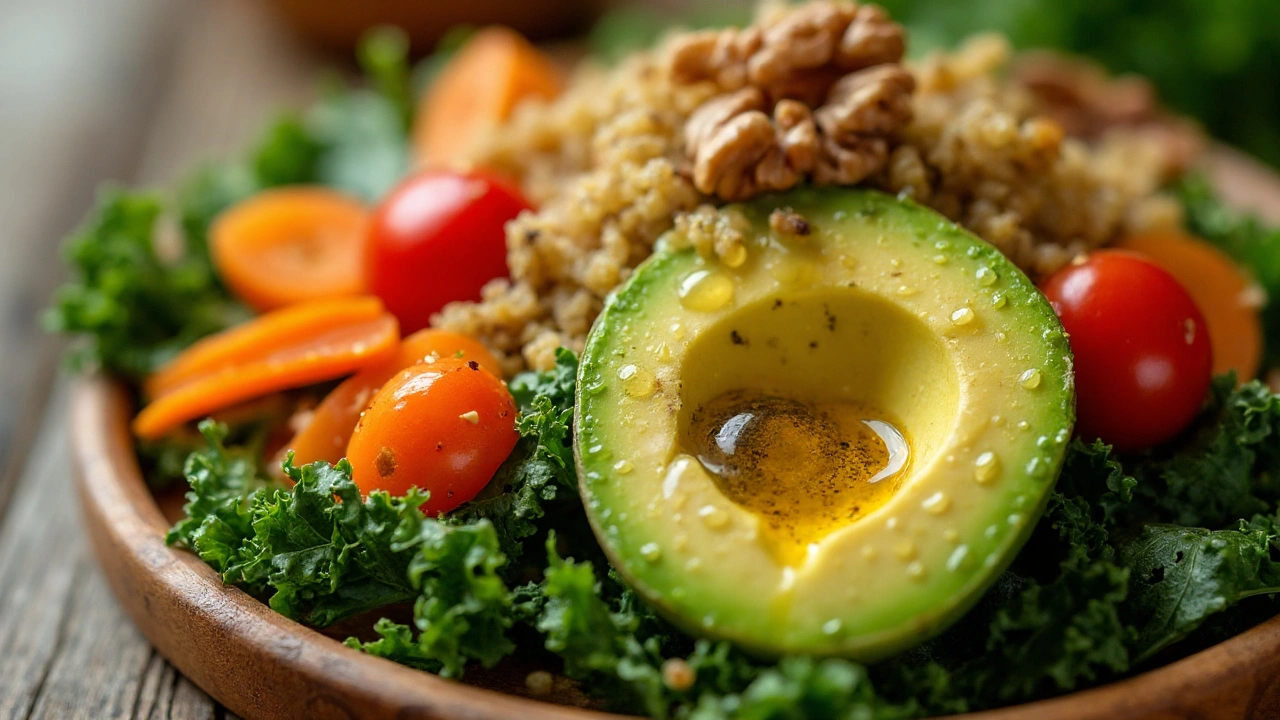Soybean oil is a plant-based cooking oil that delivers a potent mix of polyunsaturated fats, vitaminE, and phytosterols, making it a powerful dietary supplement. If you’ve ever felt stuck between “healthy” and “tasty”, this oil offers a bridge: it’s versatile enough for everyday cooking yet dense in nutrients that support heart health, inflammation control, and better absorption of fat‑soluble vitamins. Below, we break down why soybean oil deserves a spot in your pantry and how to use it without the guesswork.
Key Nutrient Profile
Understanding what’s inside the bottle helps you see the bigger health picture. The table highlights the most relevant components per tablespoon (13.6g).
| Component | Amount per tbsp | Health Role |
|---|---|---|
| Polyunsaturated Fatty Acids | 7.9g | Supports cholesterol balance |
| Monounsaturated Fatty Acids | 2.8g | Improves cell membrane fluidity |
| Omega‑6 (Linoleic Acid) | 5.8g | Essential for skin and brain |
| Omega‑3 (Alpha‑Linolenic Acid) | 0.9g | Anti‑inflammatory, heart‑protective |
| VitaminE (Tocopherols) | 1.7mg | Antioxidant, protects cells |
| Phytosterols | 176mg | May lower LDL cholesterol |
Two stand‑out nutrients deserve special mention.
- VitaminE is a fat‑soluble antioxidant that guards cell membranes from oxidative damage, a key factor in aging and chronic disease.
- Phytosterols structurally resemble cholesterol and compete for absorption, which can reduce blood cholesterol levels by up to 10% when consumed regularly.
Health Benefits Backed by Science
When you look at the nutrient profile, the real question is: what does it do for you?
Cardiovascular Support
Studies from the American Heart Association show that replacing saturated fats with polyunsaturated fats - like those in soybean oil - lowers LDL cholesterol by an average of 7% while raising HDL modestly. The combination of omega‑6 linoleic acid and phytosterols creates a double‑action effect: the fatty acids improve lipid ratios, and the sterols blunt cholesterol absorption.
Inflammation Modulation
While omega‑6 fats can be pro‑inflammatory in excess, soybean oil’s modest amount of alpha‑linolenic acid (ALA) provides a balancing omega‑3 source. Clinical trials on ALA‑rich diets report a 15‑20% reduction in C‑reactive protein, a common inflammation marker.
Enhanced Nutrient Absorption
Fat‑soluble vitamins - A, D, E, K - need dietary fat to enter the bloodstream. Adding a tablespoon of soybean oil to a salad or smoothie can boost vitamin absorption efficiency by roughly 30% compared to a low‑fat meal, according to nutrition research at Stanford.
Skin and Hair Health
VitaminE’s antioxidant power helps protect skin cells from UV‑induced oxidative stress, while the essential fatty acids maintain the lipid barrier that keeps skin supple. Users report softer skin and reduced dryness after two weeks of consistent use.
How to Use Soybean Oil as a Daily Supplement
Integrating soybean oil is easier than you think. Below are practical ways to reap the benefits without turning your kitchen into a science lab.
- **Smoothie booster** - Blend 1tbsp into fruit smoothies for a creamier texture and added nutrients.
- **Salad dressing** - Whisk 2tbsp with lemon juice, Dijon mustard, and a pinch of sea salt for a quick vinaigrette.
- **Cooking medium** - Use soybean oil for sautéing vegetables or stir‑frying; its high smoke point (≈232°C) preserves nutrients better than many lower‑smoke‑point oils.
- **Baking substitute** - Replace up to 50% of butter in muffins or quick breads to lower saturated fat while keeping moisture.
- **Post‑workout shake** - Add 1tbsp to a protein shake to improve amino‑acid uptake, as fats stimulate insulin release which aids muscle recovery.
For most adults, 1‑2tbsp per day is sufficient. If you’re on a low‑fat therapeutic diet, consult a dietitian to ensure the added calories fit your plan.
Comparison with Other Common Cooking Oils
| Attribute | Soybean Oil | Canola Oil | Olive Oil (Extra Virgin) | Sunflower Oil |
|---|---|---|---|---|
| Smoke Point (°C) | 232 | 204 | 190 | 227 |
| Omega‑6 (g per tbsp) | 5.8 | 4.1 | 1.2 | 7.0 |
| Omega‑3 (ALA) (g per tbsp) | 0.9 | 1.2 | 0.1 | 0.0 |
| VitaminE (mg per tbsp) | 1.7 | 2.4 | 1.9 | 0.6 |
| Phytosterols (mg per tbsp) | 176 | 110 | 10 | 163 |
When you line up the numbers, soybean oil stands out for its high phytosterol content and decent omega‑3 ALA, while still offering a very high smoke point. If you need an oil that handles high‑heat cooking and adds a nutritional punch, it often wins the tie.

Potential Concerns & Safety Tips
No supplement is without caveats. Here’s what to watch for:
- Oxidative stability - Like all polyunsaturated oils, soybean oil can oxidize if stored improperly. Keep it in a dark, cool pantry and use within 6months of opening.
- Omega‑6 balance - Excessive omega‑6 relative to omega‑3 may promote inflammation. Pair soybean oil with omega‑3‑rich foods (fatty fish, flaxseed) to keep the ratio near 4:1.
- Allergy risk - If you have a soy allergy, avoid soybean oil that is not highly refined; cold‑pressed or unrefined varieties may retain protein residues.
- Caloric density - One tablespoon adds about 120kcal. Account for it if you’re tracking weight.
Related Concepts and Next Steps
Understanding soybean oil opens doors to a larger conversation about dietary fats. Below are topics you might want to explore next:
- Essential fatty acids - Dive deeper into the roles of linoleic acid (omega‑6) and alpha‑linolenic acid (omega‑3) in the body.
- Fat‑soluble vitamin optimization - Learn how to pair fats with vitamins A, D, K for maximal absorption.
- Plant sterol supplementation - Examine how isolated phytosterol capsules compare to whole‑food sources like soybean oil.
- Cooking oil smoke points - A quick guide to choosing the right oil for different cooking methods.
Each of these areas builds on the nutrient foundation that soybean oil provides, helping you craft a truly holistic eating plan.
Quick Takeaways
- Soybean oil delivers poly‑ and monounsaturated fats, vitaminE, and phytosterols in one easy‑use package.
- Its high smoke point makes it ideal for stir‑frying, sautéing, and baking.
- Consuming 1‑2tbsp daily can improve cholesterol, reduce inflammation, and boost absorption of fat‑soluble nutrients.
- Watch storage, balance omega‑6 with omega‑3, and stay aware of soy allergy status.
- Pair it with other healthy fats and nutrient‑dense foods for a well‑rounded diet.
Frequently Asked Questions
Is soybean oil a good oil for heart health?
Yes. The high polyunsaturated fat content, especially linoleic acid, helps lower LDL cholesterol. Combined with phytosterols, regular use can improve overall lipid profiles when it replaces saturated fats.
How much soybean oil should I take each day?
For most adults, 1to2tablespoons (13‑27g) daily provides a solid nutrient boost without excess calories. Adjust based on total dietary fat goals and personal caloric needs.
Can I use soybean oil if I'm allergic to soy?
If you have a confirmed soy protein allergy, choose highly refined soybean oil, which removes most protein residues. Unrefined or cold‑pressed versions may still trigger a reaction.
What’s the difference between soybean oil and canola oil?
Both have high smoke points, but soybean oil contains more phytosterols and a higher omega‑6 load. Canola oil tends to have slightly more omega‑3 ALA and lower phytosterols. Choose based on your target nutrient profile.
Will cooking destroy the nutrients in soybean oil?
Unlike delicate oils, soybean oil’s high smoke point means it remains stable up to 230°C, preserving most of its fatty acids and vitaminE. However, prolonged heating can still cause oxidation, so avoid re‑using the same oil multiple times.




April Barrow
September 22, 2025 at 19:46Soybean oil is one of those things that flies under the radar but actually does a lot. I’ve been using it in my salad dressings for months now and noticed my skin isn’t as dry in winter. No magic, just science.
KALPESH GANVIR
September 23, 2025 at 04:17Been using this since my dad had his cholesterol scare last year. We swapped out butter and coconut oil for this and his numbers dropped without him even noticing. Simple changes, big results. Thanks for the breakdown.
Richie Lasit
September 24, 2025 at 14:05Y’all are underestimating how easy this is to just *add*. I throw a tablespoon in my morning smoothie with banana, spinach, and protein powder. Tastes like nothing, feels like a win. You don’t need to overhaul your whole diet - just upgrade one thing. Start there.
Jasmine L
September 25, 2025 at 05:21OMG YES. I use it in everything now 😍 My hair’s actually less frizzy and my eczema’s way better. Who knew a cheap bottle of oil could do this? 🙌
alex terzarede
September 27, 2025 at 03:28It’s worth noting that the omega-6 to omega-3 ratio in soybean oil is around 6.4:1. While not inherently bad, chronic imbalance without compensating omega-3 intake can contribute to systemic inflammation. This isn’t a criticism - just context. Pair it with flax, chia, or fatty fish.
lisa zebastian
September 27, 2025 at 09:06So soybean oil is just Big Ag’s way to get us hooked on processed fats while they patent the phytosterols. You think this is natural? The soybeans are GMO, the extraction uses hexane, and the ‘health benefits’ are just marketing spin. Wake up.
Jessie Bellen
September 28, 2025 at 13:00Stop promoting seed oils. They’re inflammatory, oxidize fast, and ruin your gut. Olive oil or coconut oil only. This is dangerous advice.
Dipali patel
September 28, 2025 at 13:26did u kno soybean oil is linked to autism?? my cousin’s kid got diagnosed after they started usin it for stir fry… also the FDA is coverin it up cuz big soy pays em… and the phytosterols? they’re just fake cholesterol!!
Jasmine Kara
September 29, 2025 at 13:23i used this for a month and my skin got better but i think it was just because i stopped eating junk? idk maybe i’m just paranoid lol
Melody Jiang
September 30, 2025 at 03:30There’s something quietly profound about how a simple, inexpensive oil can carry so much biological weight - polyunsaturates that repair cell membranes, sterols that quietly block cholesterol, vitamin E that shields our cells from decades of metabolic wear. We don’t need supplements. We need to remember that food itself is medicine, if we pay attention. Soybean oil isn’t a miracle. It’s a reminder: nutrition doesn’t have to be complicated to be powerful. Just consistent. Just real.